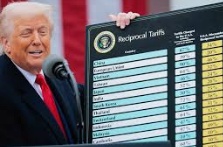Business News of Tuesday, 15 April 2025
Source: www.ghanawebbers.com
Trump’s ‘Liberation Day’ tariffs will only damage the world

The U.S. faces a new economic threat after China: Lesotho. Under Trump's new plan, China has a 54% tariff. Lesotho is proposed to have a 50% tariff on its exports to the U.S. This is higher than Cambodia's 49% and Vietnam's 46%. Other countries like Indonesia, Taiwan, India, and the EU follow with lower tariffs.
This change in trade policy is surprising. It seems no one informed the president that targeting Lesotho looks foolish. The analysis by Peter Navarro highlights alleged barriers affecting the U.S. But his reasoning oversimplifies complex trade issues.
The proposed tariffs are based on bilateral imports. This assumes trade should balance fairly with every partner. Such thinking is misguided and has become central to Trump’s trade policy. It suggests that the U.S. is a victim of global unfairness.
The situation worsens when considering Vietnam's economic development halt. Vietnam seeks benefits from open trade, which the U.S. now undermines. Emerging economies have embraced liberalism in response to past promises from the U.S.
Canada and Mexico also suffer from Trump's "fentanyl tariffs." There’s a 25% tariff on automobiles, along with increased steel and aluminum tariffs. However, these tariffs won’t close trade deficits as intended.
In the 1970s, India had high protection but low import ratios and small export income due to protectionist policies harming competitiveness. Continuing this approach will shrink both imports and exports for the U.S., leaving deficits unchanged while making everyone poorer.
Germany’s Kiel Institute warns that negative effects will primarily impact the U.S., as protectionism often backfires on administrations. Since Trump announced his tariffs, financial markets reacted negatively; the S&P 500 dropped by 45%, while Nasdaq fell nearly 50%.
Currently, stock markets remain down by about 20%. However, bond market behavior has been unusual during this downturn. Typically, investors seek bonds for safety when stocks fall.
But now bond yields are rising instead of falling—a rare occurrence in developed markets. This rise indicates concerns over America’s twin deficits: a $2 trillion fiscal deficit and over $1 trillion trade deficit expected in 2024.
When a country runs twin deficits during an economic crisis, bond yields typically increase due to loss of confidence among investors. The recent turmoil reflects punishment from bond markets against U.S policies.
This situation marks an unprecedented shift for America's financial system—acting like an emerging market rather than a stable economy. The founders of today’s global trading system learned from past protectionism failures in the early 20th century.
They established principles promoting non-discrimination and liberalization through reciprocal bargaining to create stability in international trade relations over decades of negotiations led by previous administrations.
Trump's actions threaten this legacy by imposing unprecedented levels of protectionism while dismantling achievements made by predecessors—an act perceived as war against global cooperation.
His tariffs symbolize his administration's approach: appealing to unfounded emergencies while imposing regressive taxes that disproportionately affect his political base to fund tax cuts from 2017.
These sudden increases in protection could harm both global economies and America long-term due to our interconnectedness today compared to previous eras of isolationism.
Stock markets predict significant losses ahead as capital becomes less productive under current conditions; they reflect fears about future economic viability amid ongoing turmoil—currently down around 20%.
Despite this decline, Trump appears indifferent; however, bond yields have risen significantly—prompting him eventually to reconsider his stance on tariffs after realizing their potential impact on stock prices.
Trump initially dismissed stock market drops but ultimately yielded to pressures from rising bond yields because they underpin financial stability crucial for banks' operations and corporate financing needs daily through money markets secured by bonds.
If bond markets falter due to rising yields caused by irresponsible fiscal policies or persistent deficits—the entire financial system risks collapse—a reality highlighted recently when J.P Morgan CEO Jamie Dimon urged immediate action from Trump regarding tariff delays.
Consequently, Trump decided upon delaying tariffs for three months amidst growing concerns about market stability reflecting broader implications beyond just domestic politics or individual interests at stake here within America itself moving forward into uncertain times ahead where MAGA influences persistently loom large over future prospects globally too!










